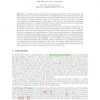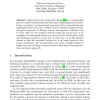33 search results - page 2 / 7 » Public-Key Encryption with Lazy Parties |
ARTCOM
2009
IEEE
13 years 11 months ago
2009
IEEE
— Consider a situation in which the transmission of encrypted message is intercepted by an adversary who can later ask the sender to reveal the random choices (and also the secre...
AMC
2005
13 years 4 months ago
2005
A convertible authenticated encryption scheme allows a designated receiver to recover and verify a message simultaneously, during which the recipient can prove the dishonesty of t...
CSFW
2008
IEEE
13 years 11 months ago
2008
IEEE
Composition theorems in simulation-based approaches allow to build complex protocols from sub-protocols in a modular way. However, as first pointed out and studied by Canetti and ...
PKC
1998
Springer
13 years 9 months ago
1998
Springer
Signcryption, first proposed by Zheng [4,5], is a cryptographic primitive which combines both the functions of digital signature and public key encryption in a logical single step,...
ASIACRYPT
2003
Springer
13 years 8 months ago
2003
Springer
This paper introduces the concept of certificateless public key cryptography (CL-PKC). In contrast to traditional public key cryptographic systems, CL-PKC does not require the use...


